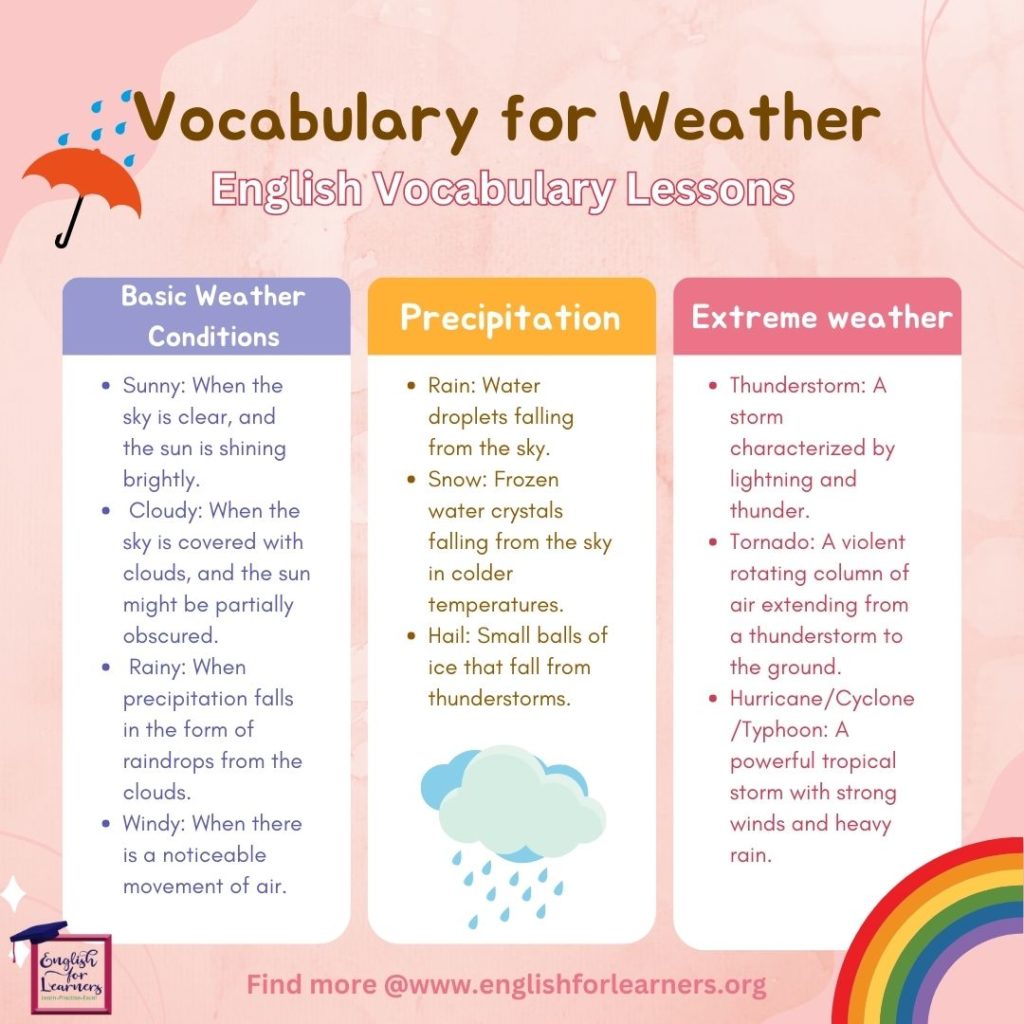Weather is an essential part of our daily lives, impacting everything from our clothing choices to our outdoor activities. Understanding weather-related vocabulary and how to use these terms correctly can help you communicate effectively and engage in conversations about the weather with confidence. In this lesson, we will explore various weather-related words and phrases, along with their meanings and example sentences.

Words related to Basic Weather Conditions
Sunny: When the sky is clear, and the sun is shining brightly.
“It’s a beautiful day outside with clear skies and a sunny disposition.”
Cloudy: When the sky is covered with clouds, and the sun might be partially obscured.
“The weather forecast predicts a mostly cloudy afternoon with a chance of rain.”
Rainy: When precipitation falls in the form of raindrops from the clouds.
“Bring an umbrella; it’s going to be a rainy day.”
Windy: When there is a noticeable movement of air.
“The wind is so strong that it’s difficult to keep my hat on.”
Words for Temperature
Hot: When the temperature is high.
“During the summer months, it can get extremely hot around here.”
Cold: When the temperature is low.
“Bundle up; it’s quite cold outside, and there’s a frosty breeze.”
Warm: When the temperature is comfortable and not too hot or cold.
“The weather is warm enough to go for a picnic this afternoon.”
Words for Precipitation (rain, hail that falls to the ground)
Rain: Water droplets falling from the sky.
“The rain started pouring just as we were about to leave.”
Snow: Frozen water crystals falling from the sky in colder temperatures.
“Children are excited about the possibility of building snowmen if it snows tonight.”
Hail: Small balls of ice that fall from thunderstorms.
“The hailstones were so large that they damaged car windshields.”
Sleet: Small ice pellets that fall when raindrops freeze before reaching the ground.
“Walking in freezing rain that turned into sleet was quite treacherous.”
Vocabulary for Extreme Weather
Thunderstorm: A storm characterized by lightning and thunder.
“Stay indoors; a thunderstorm is approaching.”
Tornado: A violent rotating column of air extending from a thunderstorm to the ground.
“The tornado warning prompted everyone to seek shelter immediately.”
Hurricane/Cyclone/Typhoon: A powerful tropical storm with strong winds and heavy rain.
“Authorities are evacuating coastal areas in preparation for the incoming hurricane.”
Weather Adjectives & Verbs
Here are some commonly used verbs and adjectives for weather. See the definitions and example sentences with each weather term.
Adjectives
Gloomy: Dark and depressing, often referring to overcast or cloudy weather.
“The gloomy sky matched his somber mood.”
Muggy: Warm and humid, with a heavy, damp feeling in the air.
“The muggy weather makes it hard to breathe.”
Breezy: Having a light and refreshing wind.
“It’s a breezy day, perfect for flying kites.”
Foggy: Covered with thick fog, reducing visibility.
“Be careful while driving; the roads are foggy this morning.”
Blistering: Extremely hot, often to an uncomfortable degree.
“The blistering heat made everyone seek shade.”
Crisp: Cool and refreshing, often associated with autumn weather.
“The air is crisp, and the leaves are changing colors.”
Damp: Slightly wet or moist, often due to recent rain or humidity.
“The ground was damp after last night’s rain.”
Verbs
Drizzle: To rain lightly in fine drops.
“It started to drizzle just as we left the house.”
Freeze: To turn into ice due to cold temperatures.
“The water in the pond will freeze in the winter.”
Clear: To become free from clouds or obstructions.
“The sky cleared up, revealing a beautiful sunset.”
Thaw: To melt from a frozen state.
“The sun’s warmth helped the ice thaw on the sidewalks.”
Sizzle: To make a hissing sound when in contact with something hot.
“The raindrops sizzled as they hit the hot pavement.”
Haze: To cover with a slight mist or fog, causing reduced visibility.
“The city skyline was hazy due to pollution.”
Gust: A sudden and strong burst of wind.
“A gust of wind blew the leaves off the trees.”
Pour: To rain heavily and steadily.
“It’s pouring outside; we should wait for the rain to stop.”
Remember to incorporate these adjectives and verbs into your conversations and writing to enrich your descriptions of weather conditions and events.
Find free printable Vocabulary worksheets here: Vocabulary Worksheets